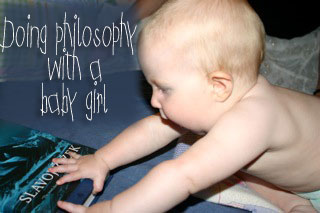 Now, I suppose we could analyze this story as a kind of emotional pickle jar; you know, when you have spent fifteen minutes trying everything to open a jar, and then you pass it to someone else who opens it on the first try. Your efforts had gotten the lid to the last step, and you just had to try once more. Rita, in fact, had done all the work with Helena, and I got the joy of hearing her stop crying, just by chance.
Now, I suppose we could analyze this story as a kind of emotional pickle jar; you know, when you have spent fifteen minutes trying everything to open a jar, and then you pass it to someone else who opens it on the first try. Your efforts had gotten the lid to the last step, and you just had to try once more. Rita, in fact, had done all the work with Helena, and I got the joy of hearing her stop crying, just by chance.However, I shared another hypothesis with Helena Iara as we rocked on the hammock (and occasionally stood or waltzed as she got fussy), one based on the ideas of Ernst Bloch, a German philosopher whp fled the Nazis and became an important in the development of Latin American thought, though he may not be very well known in the US. His most important book, the Principle of Hope, tries, like the ideas of Franz Hinkelammert I presented in my last post, to defend the value of utopia as a political category.
Hope, for Bloch, is not simply about waiting with bated breath, as we might mean when we say, "I hope it doesn't rain tomorrow." Hoping is not passive, nor is it basically mental or emotional: hope is the foundation upon which action is built. We hope that something will be better, and that hope gives us the strength to work to make it better, the faith that our efforts might have real results. Hope is active and hope is subversive of what is.
So this brings be back to several curious things about Helena. For instance, if she is crying and you lay her down on the changing table, she stops crying long before you take her diaper off. When she suffers from colic, just passing her from one set of hands to another will often quiet her. Taking her clothes off before a bath, and she begins to smile. The future begins to take effect before it arrives, if that makes sense: she is calmed and made happy by trusting that what will come will make her life better. She feels hope, and the mere existence of that hope gives her the strength to deal with what she dislikes.
Even for a baby, the present is imbued with the future.




No comments:
Post a Comment